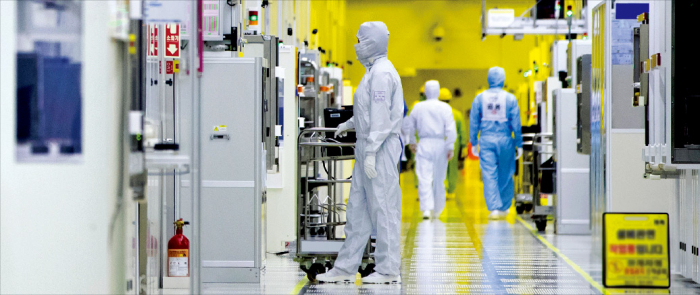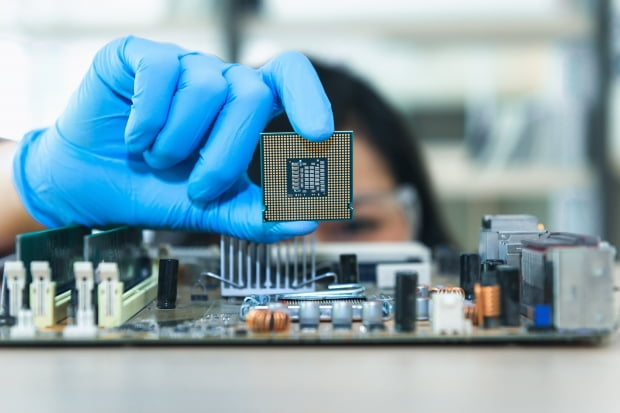Earnings
Samsung’s 2022: Year of war on uncertainty, shaky supply chain
Samsung is expected to continue to spend heavily on advanced equipment to cut manufacturing costs and stay ahead of rivals
By Jan 27, 2022 (Gmt+09:00)
4
Min read
Most Read
LG Chem to sell water filter business to Glenwood PE for $692 million


Kyobo Life poised to buy Japan’s SBI Group-owned savings bank


KT&G eyes overseas M&A after rejecting activist fund's offer


StockX in merger talks with Naver’s online reseller Kream


Mirae Asset to be named Korea Post’s core real estate fund operator



Samsung Electronics Co.'s spectacular 2021 earnings report on Thursday was overshadowed by its murky business outlook, as the world’s top maker of memory chips and smartphones skipped the routine capital expenditure plans for this year, citing uncertainty.
The South Korean tech giant warned of persistent uncertainties over the COVID-19 pandemic into 2022, although it expected global technology device demand to grow on companies’ increased IT investments.
“There exist a variety of business uncertainties, including the worldwide hiccup in the components supply chain,” Han Jin-man, executive vice president and head of Samsung’s memory global sales and marketing division, said during an earnings conference call on Jan. 27.
“We’ll carefully look at the supply and demand situation. Our investment plans for this year will be flexible.”
Earlier Thursday, Samsung posted record 2021 sales, driven by brisk sales of memory chips, premium smartphones, including foldable phones, as well as other electronic devices.
For all of 2021, the company reported all-time high revenue of 279.6 trillion won ($232 billion) in revenue on a consolidated basis, up 18.1% from the previous year. Operating profit increased 43.5% to 51.63 trillion won, the company’s third-highest quarterly performance.
In the fourth quarter of last year, Samsung logged 76.57 trillion won in revenue, marking a quarterly record and a 24% increase from the year-earlier period. Operating profit climbed 53% to a four-year high of 13.87 trillion won, while net income rose 64% to 10.8 trillion won.
The company said fourth-quarter earnings at its mainstay memory business more than doubled to 8.84 trillion won from a year ago, but decreased from the prior quarter as prices fell and bit growth -- the amount of memory produced -- came in below its guidance.
RECORD FOUNDRY BUSINESS
It said its foundry business posted record quarterly sales without revealing figures. However, profitability declined from the previous quarter due to a rise in costs related to the ramp-up of advanced process nodes.

Its display panel business saw earnings continue to improve for mobile panels in the fourth quarter, while losses in large panels widened due to price declines in LCDs and costs related to QD displays.
Revenue from the MX, or mobile experience, business increased led by premium products such as foldable phones, while its consumer electronics business posted record quarterly revenue, although its profit declined on quarter amid rising costs.
The company’s capital expenditure in 2021 reached 48.2 trillion won, including 43.6 trillion won for semiconductors and 2.6 trillion won for displays.
Spending on memory was concentrated on capacity expansion and process upgrades at fabs in Pyeongtaek, Korea and Xian, China to address the demand for advanced nodes, including EUV-based 15-nanometer DRAM and sixth-generation V-NAND, it said.
Foundry expenditures were focused on capacity expansion for 5-nanometer EUV nodes.
2022 OUTLOOK
Looking forward, Samsung said it expects growth this year across its chip business as well as in smartphones, although supplies of non-memory chips are likely to remain tight.
For memory chips, the company said global server demand will rise due to an increase in IT investments by companies. Mobile chip demand will also increase thanks to an increase in 5G-capable models, it said.
The supply of non-memory chips likely will remain tight due to 5G penetration, demand for high-performance computing and increased outsourcing from chip design and manufacturing firms.

Samsung said global demand for smartphones and tablets is forecast to decline in the first quarter compared with the previous quarter amid weak seasonality as well as uncertainties over the supply of components.
To achieve higher profit margins in its mobile segment, Samsung plans to focus on high-end premium phones this year, and as part of such efforts, it will unveil new flagship smartphones via the Galaxy Unpacked 2022 event scheduled for Feb. 9 US eastern time (midnight on Feb. 10 Seoul time).
FOCUS ON PROFITABILITY
Amid growing external uncertainties, Samsung said its business focus is now on technology leadership and profitability in an apparent turnaround from its hard push to expand market share through heavy shipments.
After announcing its fourth-quarter earnings on Thursday, Samsung said its memory chip shipments came below its initial guidance, partly because it refrained from pushing aggressively to expand sales, indicating that the company is prioritizing profitability over volume expansion.

Industry watchers expect Samsung to continue to increase its spending on state-of-the-art semiconductor equipment such as extreme ultraviolet (EUV) lithography machines to stay ahead of its rivals in technology advancement.
“We will expand the supply of high-performance products and increase the application of industry-leading EUV technology to solidify our cost competitiveness and market leadership,” Samsung said in a statement.
It said it will broadly apply its first-generation gate-all-around (GAA) transistor process technology to the mass production of foundry chips in the first half of 2022.
In October, Samsung said it will be able to commercialize an advanced 2-nanometer GAA technology by 2025 to take on bigger foundry rival Taiwan Semiconductor Manufacturing Co. (TSMC) at the leading edge of chip processing.
Write to Hyung-Suk Song and Su-Bin Lee at click@hankyung.com
In-Soo Nam edited this article.
More to Read
-
 SmartphonesSamsung to surprise market with Galaxy S22 at Feb Unpacked event
SmartphonesSamsung to surprise market with Galaxy S22 at Feb Unpacked eventJan 21, 2022 (Gmt+09:00)
2 Min read -
 TechSamsung touts latest Exynos 2200 chip as mobile game changer
TechSamsung touts latest Exynos 2200 chip as mobile game changerJan 18, 2022 (Gmt+09:00)
3 Min read -
 Home appliancesSamsung CEO: M&A deals in offing, to expand MicroLED TV facilities
Home appliancesSamsung CEO: M&A deals in offing, to expand MicroLED TV facilitiesJan 06, 2022 (Gmt+09:00)
2 Min read -
 ElectronicsSamsung Electronics to open its eco-friendly tech to competitors
ElectronicsSamsung Electronics to open its eco-friendly tech to competitorsJan 06, 2022 (Gmt+09:00)
2 Min read
Comment 0
LOG IN


